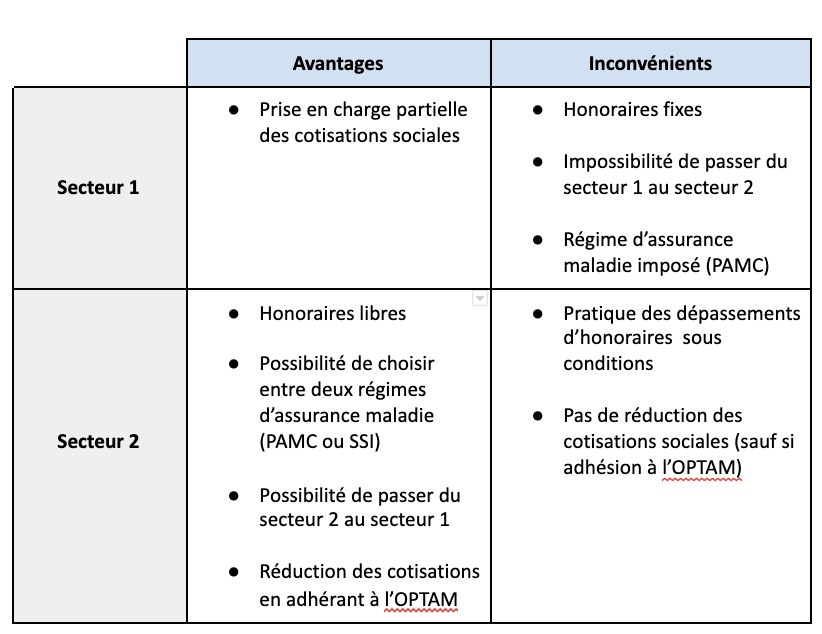Private hospital consultations offer flexibility and rapid access to medical care. However, they also have disadvantages such as higher costs for patients and limited availability of specialist doctors. It's crucial to weigh up the pros and cons before choosing this type of consultation.
Nadir Mechaï, 4th out of 9000 in the national medical competitive examination (CNG)
[arve url="https://www.youtube.com/embed/IYU04BX2_d0″/]
What is a liberal consultation?
A liberal consultation is a medical practice carried out by a doctor outside the hospital setting, in the private sector. It corresponds to a private medical consultation.often in his own practice or in a private clinic. This type of consultation is generally subject to a fee and requires prior appointment.
The advantage of a liberal consultation is that it offers greater freedom of choice for patients, who can choose their doctor and the place of consultation. This also means greater flexibility in terms of appointment times, with often shorter waiting times than in hospital departments.
Free consultations cover a wide range of medical specialties, including general medicine, dermatology, gynecology, ophthalmology and more. They therefore cover a wide range of health problems.
It should be noted that certain liberal consultations may be partially or fully reimbursed by the health insurance scheme, depending on the regulations in force and the type of complementary mutual insurance taken out by the patient. It is important to check with your health insurance fund and your mutual insurance company to find out about reimbursement conditions..
In short, a liberal consultation is a medical consultation carried out in a private setting, often on a fee-paying basis, offering greater freedom of choice and flexibility of schedule.
What's the difference between a general practitioner and a hospital practitioner?
A general practitioner is a health care professional who works in private practice or in a group of doctors, providing primary health care for patients of all ages. They are often the first point of contact for common health problems and non-urgent illnesses. General practitioners have a general medical background and are able to diagnose and treat a wide variety of medical conditions.
A hospital practitioneris a doctor who works in a hospital or clinic. They generally specialize in a specific medical field, such as surgery, pediatrics or radiology. Hospital practitioners are responsible for caring for hospitalized patients, administering complex medical treatments and coordinating the medical team.
The main difference between a GP and a hospital practitioner lies in their place of practice. The general practitioner generally works in a primary care environment, providing basic diagnostic and treatment services to ambulatory patients. Hospital practitioners, on the other hand, work in a hospital setting, caring for patients who require more advanced and specialized care.
However, it is important to note that both types of doctor can work closely together in the healthcare system to ensure continuity of care for patients.
What's the difference between public and private consultation?
The difference between public and private consultations in the context of a news site lies in the access and scope of the information available.
A consultation public means that the information is accessible to all users of the site. This generally means that articles, videos or analyses are available free of charge and without the need for a connection or subscription. Users can freely consult the news and interact with the content by leaving comments or sharing publications on social networks.
In addition, a consultation private involves restricted access to information. This can be achieved through a paid subscription, registration or login requirement. Users must provide their personal details and possibly pay to access exclusive content. This type of consultation may offer additional benefits such as members-only articles, specialized newsletters or extra features.
In short, public access is free and open to all users, while private access requires a connection or paid subscription to access exclusive content.
What's the difference between a general practitioner and a private practitioner?
A general practitioner is a doctor who has undergone general medical training and is able to treat a wide variety of health problems. He or she is often the first point of contact for patients, who may consult this doctor for common health problems such as infections, aches and pains, chronic illnesses, etc. General practitioners generally work in medical centers or clinics.
A private practitionerA GP is a doctor who works as an independent professional and has his or her own private practice. Unlike general practitioners, who may work in larger facilities, independent doctors have their own medical practices where they can see their patients. They often specialize in a particular area of medicine, such as cardiology, endocrinology, neurology and so on. Private practitioners have a more flexible schedule and can take on more complex cases requiring specialized expertise.
It's important to note that not all self-employed doctors are necessarily general practitioners, but may specialize in a specific area of medicine.
In conclusion, liberal hospital consultations have both advantages and disadvantages. On the one hand, they offer patients greater flexibility, enabling them to choose their doctor and schedule appointments more quickly. What's more, liberal consultations can be less costly for those who are not covered by medical insurance or who prefer to pay directly.
On the other hand, these consultations can lead to longer waiting times for patients who have not chosen a private doctor. What's more, private practitioners tend to prefer private consultations, which may mean less access to care for patients on lower incomes.
All in allWhile private hospital consultations offer advantages in terms of choice and speed, they can also have negative consequences for some people. It is important to take these factors into account when evaluating the healthcare system, and to strike a balance between patient choice and equitable access to care for all.








